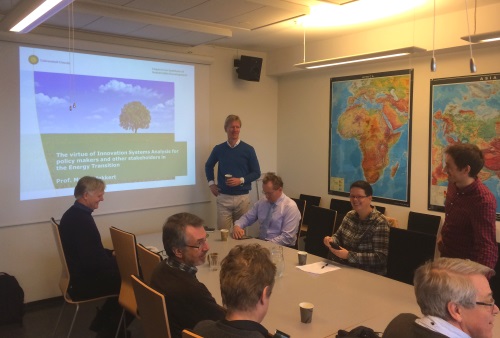 Professor Hekkert talked inspiringly about how the approach gained traction outside academia, in particular in interaction with policy makers. Photo: Jens Hanson, UiO.
Professor Hekkert talked inspiringly about how the approach gained traction outside academia, in particular in interaction with policy makers. Photo: Jens Hanson, UiO.
Professor Hekkert is the head of the Innovation Studies group at the Copernicus Institute of Sustainable Development (University of Utrecht). His presentation centered around the group’s development of the TIS framework with a focus on system functioning in analyzing emerging renewable energy technologies in the Netherlands. Professor Hekkert talked inspiringly about how the approach gained traction outside academia, in particular in interaction with policy makers.
Present at the seminar were visitors from OREEC (Oslo Renewable Energy and Environment Cluster), the Fridtjof Nansen institute, NIFU (Nordic Institute for Studies in Innovation, Research and Education), Cicero and others.
Policy makers and the complexity of innovation systems
Innovation scholars have always recognized the collective and systemic nature of innovation, and for the past couple of decades this kind of thinking has also become prevalent in the policy sector. Unfortunately, the complexity and the systemic nature of innovation is a challenge for policy makers. How are they to intervene in these complex systems? Do they have enough knowledge and information to make good decisions?
This is where innovation systems analysis comes in. Professor Hekkert argued that the approach enables an assessment of the performance of an innovation system. Policy makers and analysts off course would like to know where intervention is most needed. Innovation systems analysis can pinpoint such specific problematic areas where policy makers can intervene and stimulate an innovation system to increase its performance.
Innovation policy in the Netherlands
Professor Hekkert explained that there were two main types of innovation policy in the Netherlands pre 2010; The general neo-liberal innovation policy, and the goal oriented innovation policy directed at getting new technologies to the market in specific sectors like energy, water, etc.
A tight collaboration
Policy makers working with the second type of policy approached Prof. Hekkert’s group, which resulted in tight collaboration. In 2008, they started an experimental project using the Innovation Studies group’s approach in the design of energy innovation policy. The approach was favored for being scientifically sound while also being understandable for non-scientists.
With the change of governments in 2010 the project was discontinued, but the approach is still successfully used for monitoring the impact of innovation policy in the Netherlands.